关于时代发展与管理及管理学的科学性中英文翻译
管理学英文作文模板

管理学英文作文模板Management Studies English Essay Template。
Introduction。
Management studies is a field that encompasses various aspects of business and organizational management. It involves the study of leadership, decision-making, human resources, operations, and strategic planning. In this essay, we will explore the key concepts and principles of management studies, and their application in real-world business scenarios.Key Concepts of Management Studies。
1. Leadership: Leadership is a crucial aspect of management studies, as it involves the ability to guide and motivate a team towards achieving common goals. Effective leaders possess strong communication skills, vision, and the ability to inspire and empower their team members.2. Decision-making: Decision-making is a fundamental aspect of management, as managers are often required to make critical decisions that impact the organization's success. This involves evaluating options, considering potential outcomes, and choosing the best course of action.3. Human Resources: Managing human resources involves the recruitment, training, and development of employees within an organization. This includes creating a positive work environment, fostering employee engagement, and addressing any issues or conflicts that may arise.4. Operations: Operations management involves the planning, organizing, and controlling of processes and resources within an organization. This includes optimizing production, managing supply chains, and ensuring efficiency in day-to-day operations.5. Strategic Planning: Strategic planning involves setting long-term goals and objectives for an organization, and developing plans to achieve them. This includes analyzing market trends, identifying opportunities and threats, and developing strategies to stay competitive in the market.Application of Management Studies in Real-world Scenarios。
学术英语(管理)课文翻译
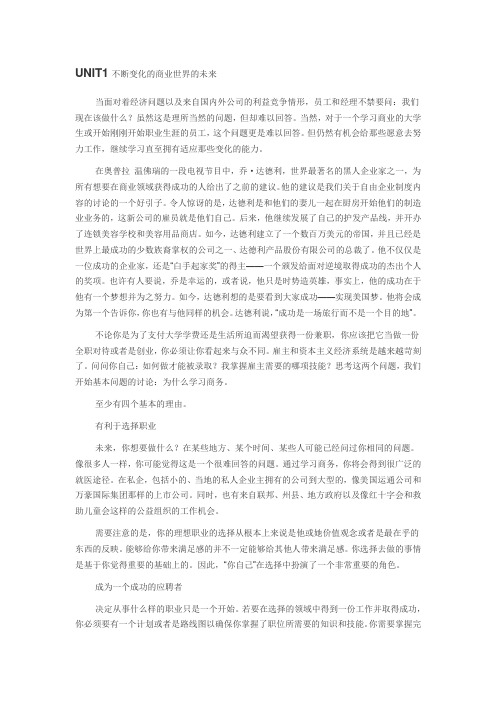
UNIT1不断变化的商业世界的未来当面对着经济问题以及来自国内外公司的利益竞争情形,员工和经理不禁要问:我们现在该做什么?虽然这是理所当然的问题,但却难以回答。
当然,对于一个学习商业的大学生或开始刚刚开始职业生涯的员工,这个问题更是难以回答。
但仍然有机会给那些愿意去努力工作,继续学习直至拥有适应那些变化的能力。
在奥普拉温佛瑞的一段电视节目中,乔·达德利,世界最著名的黑人企业家之一,为所有想要在商业领域获得成功的人给出了之前的建议。
他的建议是我们关于自由企业制度内容的讨论的一个好引子。
令人惊讶的是,达德利是和他们的妻儿一起在厨房开始他们的制造业业务的,这新公司的雇员就是他们自己。
后来,他继续发展了自己的护发产品线,并开办了连锁美容学校和美容用品商店。
如今,达德利建立了一个数百万美元的帝国,并且已经是世界上最成功的少数族裔掌权的公司之一、达德利产品股份有限公司的总裁了。
他不仅仅是一位成功的企业家,还是“白手起家奖”的得主——一个颁发给面对逆境取得成功的杰出个人的奖项。
也许有人要说,乔是幸运的,或者说,他只是时势造英雄,事实上,他的成功在于他有一个梦想并为之努力。
如今,达德利想的是要看到大家成功——实现美国梦。
他将会成为第一个告诉你,你也有与他同样的机会。
达德利说,“成功是一场旅行而不是一个目的地”。
不论你是为了支付大学学费还是生活所迫而渴望获得一份兼职,你应该把它当做一份全职对待或者是创业,你必须让你看起来与众不同。
雇主和资本主义经济系统是越来越苛刻了。
问问你自己:如何做才能被录取?我掌握雇主需要的哪项技能?思考这两个问题,我们开始基本问题的讨论:为什么学习商务。
至少有四个基本的理由。
有利于选择职业未来,你想要做什么?在某些地方、某个时间、某些人可能已经问过你相同的问题。
像很多人一样,你可能觉得这是一个很难回答的问题。
通过学习商务,你将会得到很广泛的就医途径。
在私企,包括小的、当地的私人企业主拥有的公司到大型的,像美国运通公司和万豪国际集团那样的上市公司。
科学发展观英文版

科学发展观英文版Thoroughly Applying the Scientific Outlook on DevelopmentTo continue to build a moderately prosperous society in all respects and develop socialism with Chinese characteristics at the new stage of development, we must follow the guidance of Deng Xiaoping Theory and the important thought of Three Represents and thoroughly apply the Scientific Outlook on Development.The Scientific Outlook on Development is a continuation and development of the important thoughts on development advanced by the previous three generations of central collective leadership of the CPC and a concentrated expression of the Marxist world outlook and methodology with regard to development. It is a scientific theory that is in the same line as Marxism-Leninism, Mao Zedong Thought, Deng Xiaoping Theory and the important thought of Three Represents and keeps up with the times. It is an important guiding principle for China's economic and social development and a major strategic thought that we must uphold and apply in developing socialism with Chinese characteristics.In light of the basic reality that China is in the primary stage of socialism, the Scientific Outlook on Development has been formulated to meet new requirements of development by analyzing China's own practice and drawing on the experience of other countries in development. At this new stage in the new century, China's development shows a series of new features which are mainly as follows: The economic strength has increased markedly, but the overall productivity remains low, the capacity for independent innovation is weak, and the longstanding structural problems and the extensive mode of growth are yet to be fundamentally addressed. The socialist market economy is basically in place, but there remain structural and institutional obstacles slowing down development,and further reform in difficult areas is confronted with deep-seated problems. A relatively comfortable standard of living has been achieved for the people as a whole, but the trend of a growing gap in income distribution has not been thoroughly reversed, there are still a considerable number of impoverished and low-income people in both urban and rural areas, and it has become more difficult to accommodate the interests of all sides. Efforts to balance development have yielded remarkable results, but the foundation of agriculture remains weak, the rural areas still lag behind in development, and we face an arduous task to narrow the urban-rural and interregional gaps in development and promote balanced economic and social development. Socialist democracy has continued to develop and we have made steady progress in implementing the rule of law as a fundamental principle, but efforts to improve democracy and the legal system fall somewhat short of the need to expand people's democracy and promote economic and social development, and political restructuring has to be deepened. Socialist culture is thriving as never before, but the people have growing cultural needs and have become more independent, selective, changeable and diverse in thinking, setting higher requirements for the development of an advanced socialist culture. Our society has become evidently more dynamic, but profound changes have taken place in the structure of society, in the way society is organized and in the pattern of social interests, and many new issues have emerged in social development and management. China is opening wider to the outside world, but international competition is becoming increasingly acute, pressure in the form of the economic and scientific dominance of developed countries will continue for a long time to come, both predictable and unpredictable risks are increasing, and the need to balance domestic development and opening to the outside world is greater than ever.All this shows that through the unremitting efforts we have made since the founding of the People's Republic in 1949, particularly since the introduction of the reform and opening up policy, Chinahas scored achievements in development that have captured world attention, and experienced far-reaching changes in the productive forces and the relations of production, as well as in the economic base and the superstructure. However, the basic reality that China is still in the primary stage of socialism and will remain so for a long time to come has not changed, nor has Chinese society's principal contradiction - the one between the ever-growing material and cultural needs of the people and the low level of social production. The current features of development in China are a concrete manifestation of that basic reality at this new stage in the new century. Stressing recognition of the basic reality is not meant to belittle ourselves, wallow in backwardness, or encourage unrealistic pursuit of quick results. Rather, such recognition will serve as the basis of our endeavor to advance reform and plan for development. We must always remain sober-minded, base our efforts on the most significant reality that China is in the primary stage of socialism, scientifically analyze the new opportunities and challenges arising from China's full involvement in economic globalization, fully understand the new situation and tasks in China's advance toward an industrialized, information-based, urbanized, market-oriented and internationalized country, have a good grasp of the new issues and problems we face in development, follow more conscientiously the path of scientific development, and strive to open up a broader vista for developing socialism with Chinese characteristics.The Scientific Outlook on Development takes development as its essence, putting people first as its core, comprehensive, balanced and sustainable development as its basic requirement, and overall consideration as its fundamental approach.- We must regard development as the top priority of the Party in governing and rejuvenating the country. Development is of decisive significance for building a moderately prosperous society in all respects and speeding up socialist modernization. We must firmly commit ourselves to the central task of economic development,concentrate on construction and development, and keep releasing and developing the productive forces. We must better implement the strategy of rejuvenating the country through science and education, the strategy of strengthening the nation with trained personnel and the strategy of sustainable development. We must grasp the law of development, make innovations in our thinking, transform the mode of development, crack hard issues and raise quality and efficiency to achieve sound and rapid development, so that we can lay a solid foundation for developing socialism with Chinese characteristics. We must strive for scientific development by putting people first and making it comprehensive, balanced and sustainable; we must strive for harmonious development by integrating all undertakings and promoting unity and amity among all members of society; and we must strive for peaceful development in the course of which China develops itself by safeguarding world peace and contributes to world peace by developing itself.- We must always put people first. Serving the people wholeheartedly is the fundamental purpose of the Party, and its every endeavor is for the well-being of the people. We must always make sure that the aim and outcome of all the work of the Party and the state is to realize, safeguard and expand the fundamental interests of the overwhelming majority of the people. We must respect the principal position of the people in the country's political life, give play to their creativity, protect their rights and interests, take the path of prosperity for all and promote their all-round development, to ensure that development is for the people, by the people and with the people sharing in its fruits.- We must pursue comprehensive, balanced and sustainable development. In accordance with the overall arrangements for the cause of socialism with Chinese characteristics, we will promote all-round economic, political, cultural and social development, coordinate all links and aspects of our modernization drive, and balance the relations of production with the productive forces and the superstructure with the economic base. We must adopt anenlightened approach to development that results in expanded production, a better life and sound ecological and environmental conditions, and build a resource-conserving andenvironment-friendly society that coordinates growth rate with the economic structure, quality and efficiency, and harmonizes economic growth with the population, resources and the environment, so that our people will live and work under sound ecological and environmental conditions and our economy and society will develop in a sustainable way.- We must persist in overall consideration. We need to correctly understand and handle the major relationships in the cause of socialism with Chinese characteristics and balance urban and rural development, development among regions, economic and social development, relations between man and nature, and domestic development and opening to the outside world. We must take into overall consideration the relationships between the central and local authorities, between personal and collective interests, between interests of the part and those of the whole, and between immediate and long-term interests, so as to fully arouse the initiative of all sides. We must take both the domestic and international situations into consideration, develop a global and strategic perspective, be good at seizing opportunities for development and coping with risks and challenges in a changing world, and work for a favorable international environment. While planning our work from an overall perspective, we need to work hard to make breakthroughs on the key issues that affect the overall situation and on the major problems that affect public interests.To thoroughly apply the Scientific Outlook on Development, we must always adhere to the Party's basic line of taking economic development as the central task and upholding the Four Cardinal Principles and the reform and opening up policy, known as " one central task and two basic points." As the lifeblood of the Party and the country, this basic line provides the political guarantee for scientific development. Taking economic development as thecentral task is vital to invigorating our nation and is the fundamental requirement for the robust growth and lasting stability of the Party and the nation. The Four Cardinal Principles are the very foundation for building our country and the political cornerstone for the survival and development of the Party and the nation. Reform and opening up are the path to a stronger China and the source of vitality for the Party and the nation in development and progress. We will continue to apply the line of " one central task and two basic points" in its entirety in our great endeavor to develop socialism with Chinese characteristics; we will never deviate from this line.To thoroughly apply the Scientific Outlook on Development, we must work energetically to build a harmonious socialist society. Social harmony is an essential attribute of socialism with Chinese characteristics. Scientific development and social harmony are integral to each other and neither is possible without the other. Building a harmonious socialist society is a historical mission throughout the cause of socialism with Chinese characteristics, as well as a historical process and the social outcome of correctly handling various social problems on the basis of development. It is through development that we will increase the material wealth of society and constantly improve people's lives, and it is again through development that we will guarantee social equity and justice and constantly promote social harmony. To realize social equity and justice is the Chinese Communists' consistent position and a major task of developing socialism with Chinese characteristics. In accordance with the general requirements for democracy and the rule of law, equity and justice, honesty and fraternity, vigor and vitality, stability and order, and harmony between man and nature and the principle of all the people building and sharing a harmonious socialist society, we will spare no effort to solve the most specific problems of the utmost and immediate concern to the people and strive to create a situation in which all people do their best, find their proper places in society and live together in harmony, so as toprovide a favorable social environment for development.To thoroughly apply the Scientific Outlook on Development, we must continue to deepen reform and opening up. We need to incorporate the spirit of reform and innovation into all links of governance, unswervingly adhere to the orientation of reform, and have more scientific decision-making and better coordinated measures for reform. We will improve the socialist market economy, promote institutional reform and innovation in various sectors, accelerate reform in important fields and crucial links, improve opening up in all respects and make our systems and mechanisms full of vigor, highly efficient, more open and conducive to scientific development, so as to provide a powerful driving force and an institutional guarantee for developing socialism with Chinese characteristics. We will always take improving people's lives as a pivotal task in balancing reform, development and stability and ensure that our reform always has the endorsement and support of the people.To thoroughly apply the Scientific Outlook on Development, we must strengthen our efforts to build the Party in earnest. As is required by the Party's lofty mission of governing and rejuvenating the nation, our efforts to improve the Party's governance capability and maintain and develop its vanguard nature must serve our task of directing scientific development, promoting social harmony, guiding development and progress in China and better representing and realizing the fundamental interests of the overwhelming majority of the people. In this way, the Party's work and our efforts to build the Party will better meet the requirement of the Scientific Outlook on Development and provide a reliable political and organizational guarantee for scientific development.All Party members must fully understand the content and grasp the essence of the Scientific Outlook on Development, be more conscious and determined in applying it, change notions that are not in line with it, work hard to solve major problems that affect or constrain scientific development, direct the whole society'senthusiasm for development to scientific development, and apply this outlook to every aspect of economic and social development.。
科学管理英文演讲稿范文
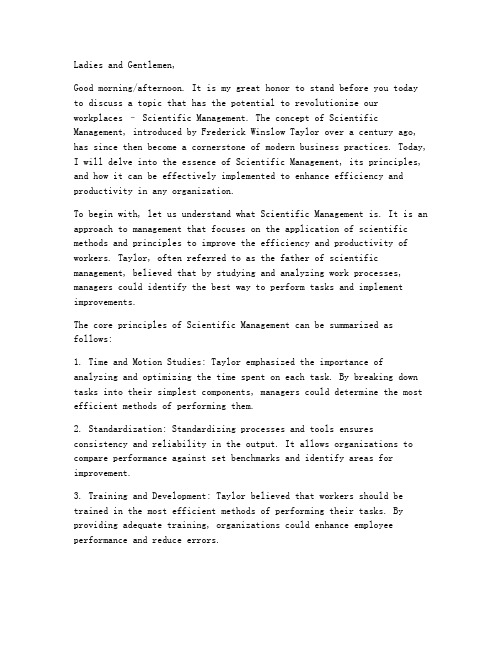
Ladies and Gentlemen,Good morning/afternoon. It is my great honor to stand before you today to discuss a topic that has the potential to revolutionize our workplaces – Scientific Management. The concept of Scientific Management, introduced by Frederick Winslow Taylor over a century ago, has since then become a cornerstone of modern business practices. Today, I will delve into the essence of Scientific Management, its principles, and how it can be effectively implemented to enhance efficiency and productivity in any organization.To begin with, let us understand what Scientific Management is. It is an approach to management that focuses on the application of scientific methods and principles to improve the efficiency and productivity of workers. Taylor, often referred to as the father of scientific management, believed that by studying and analyzing work processes, managers could identify the best way to perform tasks and implement improvements.The core principles of Scientific Management can be summarized as follows:1. Time and Motion Studies: Taylor emphasized the importance of analyzing and optimizing the time spent on each task. By breaking down tasks into their simplest components, managers could determine the most efficient methods of performing them.2. Standardization: Standardizing processes and tools ensures consistency and reliability in the output. It allows organizations to compare performance against set benchmarks and identify areas for improvement.3. Training and Development: Taylor believed that workers should be trained in the most efficient methods of performing their tasks. By providing adequate training, organizations could enhance employee performance and reduce errors.4. Division of Labor: Breaking down complex tasks into smaller, specialized tasks allows workers to become highly skilled in specific areas, thereby increasing overall productivity.5. Incentive Systems: Implementing incentive programs, such as piece-rate pay, can motivate workers to achieve higher levels of performance.Now, let us explore how Scientific Management can be effectively implemented in today's workplaces:1. Analyze Work Processes: Conduct thorough time and motion studies to identify inefficiencies and bottlenecks in work processes. Use this data to design optimized workflows.2. Invest in Technology: Leverage modern technology to streamline operations and enhance communication. Automation can reduce manual labor and improve accuracy.3. Empower Employees: Involve employees in the process of identifying and implementing improvements. This not only fosters a sense of ownership but also taps into the collective wisdom of the workforce.4. Develop a Culture of Continuous Improvement: Encourage a culture where employees are motivated to seek out and implement improvements. This can be achieved through regular training sessions, brainstorming sessions, and incentives.5. Monitor and Measure Performance: Regularly track performance against set benchmarks and use the data to make informed decisions. This ensures that the organization remains on the path to continuous improvement.In conclusion, Scientific Management offers a proven framework for enhancing efficiency and productivity in organizations. By embracing its principles and implementing them effectively, businesses can achieve higher levels of performance and gain a competitive edge in the market.Thank you for your attention. I welcome any questions or thoughts you may have regarding the power of Scientific Management. Let us strive to create workplaces that not only thrive but also inspire.。
科学管理 英语
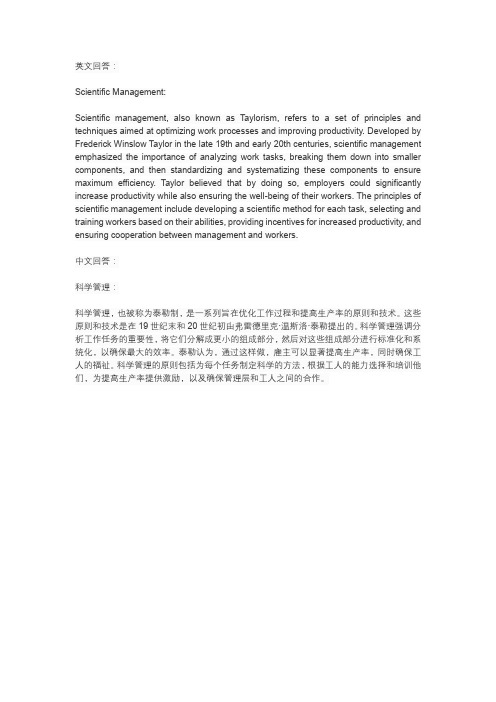
英文回答:Scientific Management:Scientific management, also known as Taylorism, refers to a set of principles and techniques aimed at optimizing work processes and improving productivity. Developed by Frederick Winslow Taylor in the late 19th and early 20th centuries, scientific management emphasized the importance of analyzing work tasks, breaking them down into smaller components, and then standardizing and systematizing these components to ensure maximum efficiency. Taylor believed that by doing so, employers could significantly increase productivity while also ensuring the well-being of their workers. The principles of scientific management include developing a scientific method for each task, selecting and training workers based on their abilities, providing incentives for increased productivity, and ensuring cooperation between management and workers.中文回答:科学管理:科学管理,也被称为泰勒制,是一系列旨在优化工作过程和提高生产率的原则和技术。
科学发展观
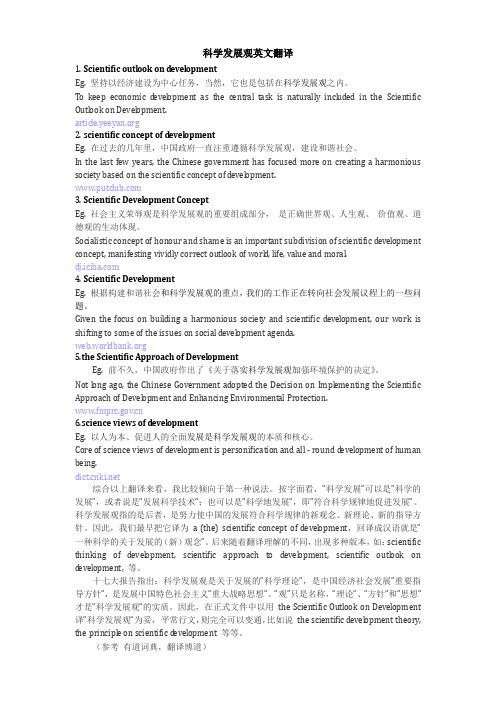
科学发展观英文翻译1. Scientific outl ook on d evel opmentEg. 坚持以经济建设为中心任务,当然,它也是包括在科学发展观之内。
To keep economic d evelopment as the central task is naturally includ ed in the Scientific Outl ook on Development.2. scientific concept of d evel opmentEg. 在过去的几年里,中国政府一直注重遵循科学发展观,建设和谐社会。
In the last few years, the Chinese government has focused more on creating a harmonious society based on the scientific concept of devel opment.3. Scientific Development ConceptEg. 社会主义荣辱观是科学发展观的重要组成部分,是正确世界观、人生观、价值观、道德观的生动体现。
Socialistic concept of honour and shame is an important subdivision of scientific development concept, manifesting vividly correct outl ook of world, life, value and moral.4. Scientific DevelopmentEg. 根据构建和谐社会和科学发展观的重点,我们的工作正在转向社会发展议程上的一些问题。
Given the focus on building a harmonious society and scientific devel opment, our work is shifting to some of the issues on social devel opment agenda.web.worl 5.the Scientific Approach of DevelopmentEg. 前不久,中国政府作出了《关于落实科学发展观加强环境保护的决定》。
科学管理原理英文

科学管理原理英文Scientific Management PrinciplesScientific management, also known as Taylorism, is a management theory that aims to improve efficiency and productivity in organizations. Developed by Frederick Winslow Taylor in the early 20th century, it focuses on the systematic study of work processes and the use of scientific methods to identify the most efficient way to perform tasks. This article discusses the principles of scientific management and their application in the modern business environment.1. Principle of Work StudyThe principle of work study involves analyzing and breaking down tasks into their basic elements to determine the most efficient way to perform them. This involves conducting time and motion studies to identify unnecessary movements, eliminate waste, and optimize work processes. By eliminating unnecessary tasks and standardizing work methods, organizations can reduce costs, improve productivity, and enhance employee satisfaction.2. Principle of Scientific Selection and TrainingScientific management emphasizes the importance of selecting the right people for the right job and providing them with the necessary training and development. This principle involves identifying the skills, knowledge, and abilities required for each job, and then systematically recruiting and selecting individuals who possess these qualities. Additionally, organizationsshould provide adequate training to ensure that employees have the necessary skills to perform their tasks effectively and efficiently.3. Principle of StandardizationThe principle of standardization involves developing and implementing standardized procedures and methods for performing tasks. By establishing standard operating procedures, organizations can ensure consistency, minimize errors, and improve efficiency. Standardization also facilitates the training of new employees, as they can easily learn and follow established procedures.4. Principle of Division of LaborThe principle of division of labor is based on the idea that breaking down complex tasks into smaller, specialized tasks can improve efficiency and productivity. By assigning specific tasks to individuals who specialize in those areas, organizations can take advantage of their expertise and reduce the time required to complete tasks. This leads to increased efficiency and improved overall performance.5. Principle of Incentives and RewardsScientific management recognizes the importance of providing incentives and rewards to motivate employees and enhance their performance. Taylor advocated for the use of financial incentives, such as piece-rate systems, to reward employees for their productivity. This principle encourages employees to work harder and more efficiently, as they are directly rewarded for their efforts.6. Principle of Functional ForemanshipThe principle of functional foremanship involves separating the planning and execution functions of management. Under this system, each worker is accountable to two supervisors - one responsible for planning and another for execution. This allows for greater specialization and expertise in each area, leading to improved coordination and efficiency.7. Principle of Cooperation between Management and EmployeesScientific management emphasizes the importance of cooperation and collaboration between management and employees. Taylor believed that effective management involved fostering a harmonious working relationship between employers and employees, based on mutual trust and respect. This principle aims to create a positive work environment that enhances employee satisfaction and productivity.In conclusion, scientific management principles provide a framework for maximizing efficiency and productivity in organizations. By applying these principles, businesses can streamline work processes, improve employee performance, and achieve better results. While scientific management has received criticism for its mechanistic approach, many of its principles continue to be relevant and influential in modern management practices.。
科学发展观 the Outlook of Scientific Development 等最新词汇翻译
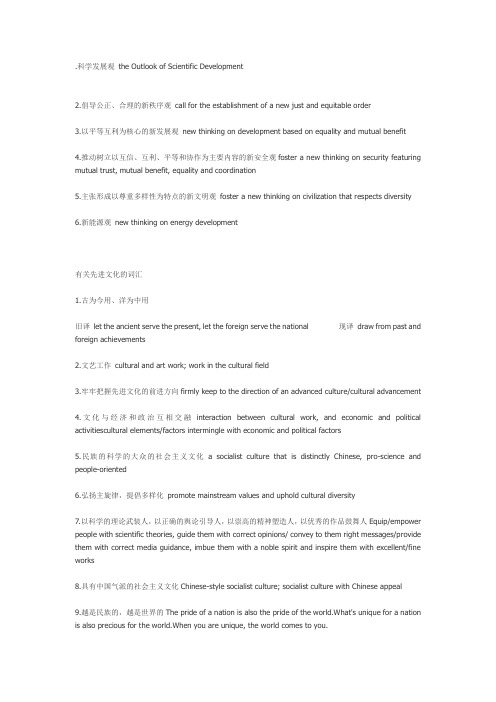
.科学发展观the Outlook of Scientific Development2.倡导公正、合理的新秩序观call for the establishment of a new just and equitable order3.以平等互利为核心的新发展观new thinking on development based on equality and mutual benefit4.推动树立以互信、互利、平等和协作为主要内容的新安全观foster a new thinking on security featuring mutual trust, mutual benefit, equality and coordination5.主张形成以尊重多样性为特点的新文明观foster a new thinking on civilization that respects diversity6.新能源观new thinking on energy development有关先进文化的词汇1.古为今用、洋为中用旧译let the ancient serve the present, let the foreign serve the national 现译draw from past and foreign achievements2.文艺工作cultural and art work; work in the cultural field3.牢牢把握先进文化的前进方向firmly keep to the direction of an advanced culture/cultural advancement4.文化与经济和政治互相交融interaction between cultural work, and economic and political activitiescultural elements/factors intermingle with economic and political factors5.民族的科学的大众的社会主义文化 a socialist culture that is distinctly Chinese, pro-science and people-oriented6.弘扬主旋律,提倡多样化promote mainstream values and uphold cultural diversity7.以科学的理论武装人,以正确的舆论引导人,以崇高的精神塑造人,以优秀的作品鼓舞人Equip/empower people with scientific theories, guide them with correct opinions/ convey to them right messages/provide them with correct media guidance, imbue them with a noble spirit and inspire them with excellent/fine works8.具有中国气派的社会主义文化Chinese-style socialist culture; socialist culture with Chinese appeal9.越是民族的,越是世界的The pride of a nation is also the pride of the world.What's unique for a nation is also precious for the world.When you are unique, the world comes to you.10.文艺应当贴近群众,贴近生活,贴近实际。
浅谈时代发展与管理及管理学的科学性
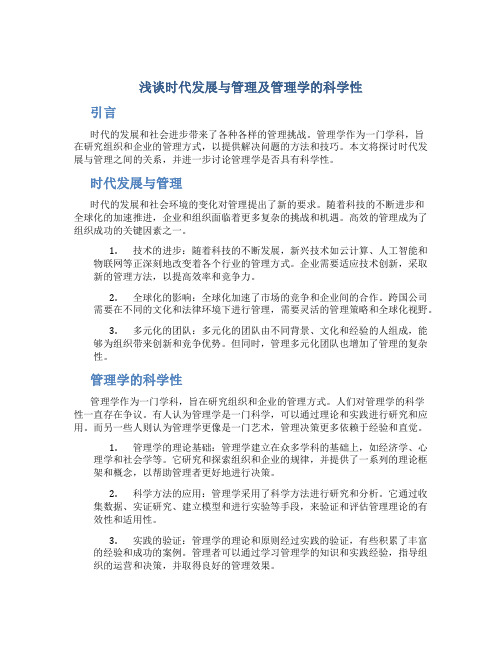
浅谈时代发展与管理及管理学的科学性引言时代的发展和社会进步带来了各种各样的管理挑战。
管理学作为一门学科,旨在研究组织和企业的管理方式,以提供解决问题的方法和技巧。
本文将探讨时代发展与管理之间的关系,并进一步讨论管理学是否具有科学性。
时代发展与管理时代的发展和社会环境的变化对管理提出了新的要求。
随着科技的不断进步和全球化的加速推进,企业和组织面临着更多复杂的挑战和机遇。
高效的管理成为了组织成功的关键因素之一。
1.技术的进步:随着科技的不断发展,新兴技术如云计算、人工智能和物联网等正深刻地改变着各个行业的管理方式。
企业需要适应技术创新,采取新的管理方法,以提高效率和竞争力。
2.全球化的影响:全球化加速了市场的竞争和企业间的合作。
跨国公司需要在不同的文化和法律环境下进行管理,需要灵活的管理策略和全球化视野。
3.多元化的团队:多元化的团队由不同背景、文化和经验的人组成,能够为组织带来创新和竞争优势。
但同时,管理多元化团队也增加了管理的复杂性。
管理学的科学性管理学作为一门学科,旨在研究组织和企业的管理方式。
人们对管理学的科学性一直存在争议。
有人认为管理学是一门科学,可以通过理论和实践进行研究和应用。
而另一些人则认为管理学更像是一门艺术,管理决策更多依赖于经验和直觉。
1.管理学的理论基础:管理学建立在众多学科的基础上,如经济学、心理学和社会学等。
它研究和探索组织和企业的规律,并提供了一系列的理论框架和概念,以帮助管理者更好地进行决策。
2.科学方法的应用:管理学采用了科学方法进行研究和分析。
它通过收集数据、实证研究、建立模型和进行实验等手段,来验证和评估管理理论的有效性和适用性。
3.实践的验证:管理学的理论和原则经过实践的验证,有些积累了丰富的经验和成功的案例。
管理者可以通过学习管理学的知识和实践经验,指导组织的运营和决策,并取得良好的管理效果。
然而,管理学也存在一些争议和挑战。
由于组织和企业的复杂性,管理学的理论和模型并不适用于所有情况,需要根据具体情况进行调整和应用。
管理学罗宾斯11版中英文对照详解
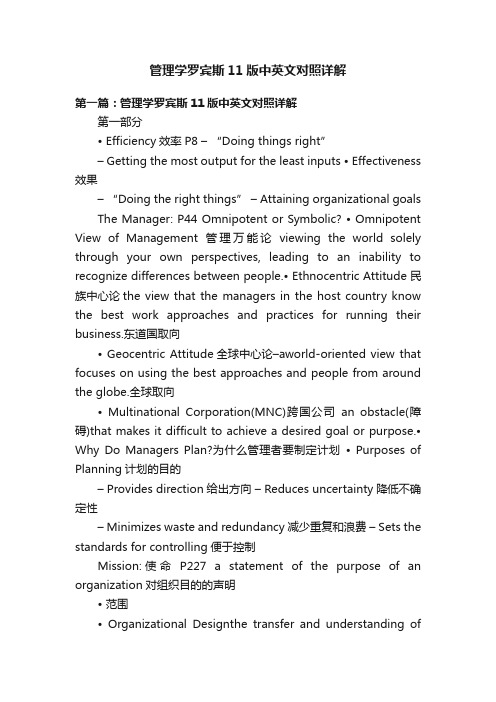
管理学罗宾斯11版中英文对照详解第一篇:管理学罗宾斯11版中英文对照详解第一部分• Efficiency效率P8 –“Doing things right”–Getting the most output for the least inputs • Effectiveness 效果–“Doing the right things” – Attaining organizational goals The Manager: P44 Omnipotent or Symbolic? • Omnipotent View of Management管理万能论viewing the world solely through your own perspectives, leading to an inability to recognize differences between people.• Ethnocentric Attitude民族中心论the view that the managers in the host country know the best work approaches and practices for running their business.东道国取向• Geocentric Attitude全球中心论–aworld-oriented view that focuses on using the best approaches and people from around the globe.全球取向• Mu ltinational Corporation(MNC)跨国公司an obstacle(障碍)that makes it difficult to achieve a desired goal or purpose.• Why Do Managers Plan?为什么管理者要制定计划• Purposes of Planning计划的目的– Provides direction给出方向– Reduces uncertainty降低不确定性– Minimizes waste and redundancy减少重复和浪费– Sets the standards for controlling便于控制Mission:使命P227 a statement of the purpose of an organization对组织目的的声明• 范围• Organizational Designthe transfer and understanding ofmeaning.意义的传递和理解• Transfer means the message was received in a form that ca n be interpreted by the receiver.• Understanding the message is not the same as the receiver agreeing with the message.• Interpersonal Communication人际沟通-communication between two or more people.主要指存在于两人或多人之间的沟通;• Organizational Communication组织沟通-all the patterns, networks, and systems ofcommunications within an organization.主要指组织中沟通的各种方式、网络Work specialization工作专门化Departmentalization部门化Chain of command指挥链Span of control管理跨度Centralization and decentralization集权与分权 Formalization 正规化和系统。
科学发展观英文
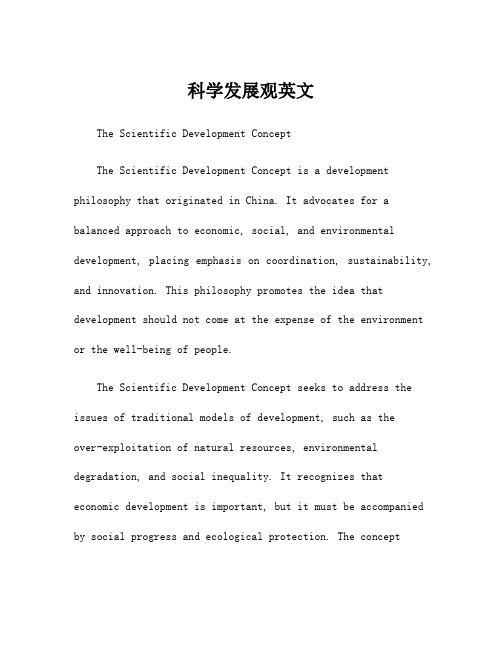
科学发展观英文The Scientific Development ConceptThe Scientific Development Concept is a development philosophy that originated in China. It advocates for a balanced approach to economic, social, and environmental development, placing emphasis on coordination, sustainability, and innovation. This philosophy promotes the idea that development should not come at the expense of the environment or the well-being of people.The Scientific Development Concept seeks to address the issues of traditional models of development, such as theover-exploitation of natural resources, environmental degradation, and social inequality. It recognizes that economic development is important, but it must be accompanied by social progress and ecological protection. The conceptemphasizes the importance of democracy, rule of law, andsocial justice in promoting development.The Scientific Development Concept has been incorporated into China's Five-Year Plans, and it has a significant impact on China's approach to development. It has also gained attention from other countries that are seeking sustainable and balanced approaches to development.翻译:科学发展观科学发展观是起源于中国的一种发展理念。
《学术英语(管理)》unit7课文翻译

学术英语(管理)Unit 7 课文翻译引言本文是学术英语(管理)Unit 7的课文翻译,旨在帮助读者更好地了解和学习管理领域的学术英语。
本课文主要介绍了领导和管理的关系,以及领导在组织中的作用。
以下是课文的详细翻译。
##第一段在组织中,领导和管理是两个相互关联但又有所区别的概念。
领导是指一个人在组织中为实现共同目标而影响和激励他人的能力。
领导者通常具备影响力和魅力,能够激发员工的动力和创新。
管理则是指为实现组织目标而规划、组织、指导和控制资源的过程。
管理者通常需要具备良好的组织和决策能力,以确保组织的正常运转和目标的达成。
##第二段在许多组织中,领导和管理往往被视为同一概念,但他们确实有不同的重点和目标。
领导注重于通过影响和激励他人来达到共同目标,而管理更注重于规划和控制资源以实现组织目标。
领导者通常是激励员工的动力和创新的推动者,而管理者则负责制定和执行策略来实现组织的目标。
##第三段在现代组织中,领导在推动创新和变革方面起着至关重要的作用。
一个优秀的领导者能够为组织设定清晰的愿景和目标,并激励员工为其努力。
他们还能够鼓励创新和学习,以应对不断变化的市场环境。
另一方面,管理者则负责确保组织的运营和资源的优化。
他们需要制定有效的管理策略和运营模式,并监控组织的绩效和成果。
##第四段领导和管理之间的关系可以通过一个简单的比喻来解释。
领导者就像一个驾驶员,决定了组织应该前进的方向,并激励员工为之努力。
而管理者则像是汽车的引擎,提供动力和资源来推动组织的运转。
没有引擎,驾驶者就无法控制汽车的运动方向。
同样地,没有领导者,管理者难以为组织设定明确的目标和愿景。
##第五段总结而言,领导和管理是组织中不可或缺的两个概念。
他们之间有一定的区别,但又相互关联。
领导器通常是推动创新和改变的推动者,而管理者则负责组织的运营和资源的优化。
在现代组织中,领导和管理的结合是成功的关键。
结论本文通过翻译《学术英语(管理)》Unit 7的课文,介绍了领导和管理的概念和作用。
科学发展观翻译

科学发展观翻译中国翻译《中国翻译》最新发布的中译英词汇加强农业基础地位strengthen the position of agriculture as the foundation of the economy形成城乡经济社会发展一体化新格局make progress in integrating economic and social development in urban and rural areas促进农业科技进步promote advances in agriculture-related science and technology 增强农业综合生产能力improve overall agricultural production capacity壮大县域经济expand county economies多渠道转移农民就业create more jobs for rural surplus labor force提高扶贫开发水平make poverty reduction more effective through development 改革集体林权制度reform the system of collective forest use rights坚持农村基本经营制度uphold the basic system for the rural economy发展适度规模经营develop appropriately scaled operations农民专业合作组织specialized farmers’cooperatives支持农业产业化经营和龙头企业发展support theindustrialization of agriculture and the development of leading agribusinesses把建设资源节约型、环境友好型社会放在工业化、现代化发展战略的突出位置,落实到每个单位、每个家庭give prominence to building a resource-conserving, environment-friendly society in our strategy for industrialization and modernization and make every organization and family to act accordingly开发和推广节约、替代、循环利用的先进适用技术develop and extend advanced and appropriate technologies for conserving, substituting and recycling energy and resources发展环保产业develop environmental conservation industries促进生态修复promote restoration of the ecosystems优化国土开发格局improve land development program实现基本公共服务均等化ensure equal access to basic public services西部大开发large-scale development of western China/China’s western development 促进中部地区崛起boost the development of the central region突破行政区划界限,形成若干带动力强、联系紧密的经济圈和经济带Break administrative divisions to form a number of close-knit economic rims and belts that will boost the development of the surrounding areas帮助资源枯竭地区实现经济转型help transform the economies of areas where natural resources are exhausted增强综合承载能力increase the overall carrying capacity of cities 以特大城市为依托,形成辐射作用大的城市群,培育新的经济增长极form city clusters with mega-cities as the core so that they can boost development in surrounding areas and become new poles of economic growth坚持平等保护物权ensure equal protection of property rights 深化国有企业公司制股份制改革deepen the reform to introduce the corporate and shareholding systems in SOEs增强国有经济活力、控制力、影响力enhance the dynamism, leverage and influence of the state sector of the economy 国有资本经营预算制度budget system for managing state capital发展多种形式的集体经济、合作经济develop collective and cooperative economic operations in diverse forms个体、私营经济self-employed and other private businesses/private economy以现代产权制度为基础,发展混合所有制经济develop the economic sector of mixed ownership based on the modern system of property rights共同建设、共同享有的原则the principle of all the peoplebuilding a harmonious ...and enjoy its benefits着力解决人民最关心、最直接、最现实的利益问题spare no effort to solve most practical problems of the utmost and immediate concern to the people形成全体人民各尽其能、各得其所而又和谐相处的局面cultivate/foster an environment in which all people do their best, are content with their lives/enjoy what they do and live together in harmony提高改革决策的科学性,增强改革措施的协调性make decision-making more scientific and measures of reform better coordinated全面提高开放水平improve the work of opening-up把改善人民生活作为正确处理改革发展稳定关系的结合点We need to improve...as we endeavor to balance...全面把握科学发展观的科学内涵和精神实质fully appreciate/understand the essence of the Scientific Outlook on Development把全社会的发展积极性引导到科学发展上来guide the whole society in pursuing development in a scientific way把握经济社会发展趋势和规律follow the trend and the law of economic and social development坚持中国特色社会主义经济建设、政治建设、文化建设、社会建设的基本目标和基本政策构成的基本纲领uphold the basic program consisting of the basic objectives and policies for economic, political, cultural and social progress under socialism with Chinese characteristics区域协调互动发展机制 a mechanism for promoting balanced and interactive development among regions主体功能区development priority zones法治政府建设enhance law-based government administration 社会主义核心价值体系深入人心Core socialist values are winning the hearts and minds of the people.弘扬良好思想道德风尚promote moral integrity建设生态文明promote a conservation culture生态文明观念在全社会牢固树立To foster public awareness of conservation culture 具有更高文明素质和精神追求Raise ethical standards and have higher/lofty aspiration 对外更加开放、更加具有亲和力be more open and friendly to the outside world为全面建成惠及十几亿人口的更高水平的小康社会打下更加牢固的基础Strengthen the foundation for building a well-off society of a higher level in all respects to the benefit of over one billion people建设创新型国家make China an innovative nation国家中长期科学和技术发展规划纲要Outline of the NationalProgram for Long- and Medium-Term Scientific and Technological Development突破制约经济社会发展的关键技术make breakthroughs in key technologies vital to China,s economic and social development支持前沿技术研究、社会公益性技术研究support research in frontier technology and in technology for public welfare建立以企业为主体、市场为导向、产学研相结合的技术创新体系establish a market-oriented system for technological innovation, in which enterprises play the leading role and which combines the efforts of enterprises, universities and research institutes引导和支持创新要素向企业集聚guide and support the pooling of factors of innovation into enterprises科技成果产业化the application of scientific and technological achievements in production培养造就世界一流科学家和科技领军人才train / bring up world-class scientists and leaders in scientific and technological research使创新智慧竞相迸发、创新人才大量涌现inspire creativity and bring forth large numbers of innovative personnel推进信息化与工业化融合promote IT-based industrialization 具有国际竞争力的大企业集团internationally competitive conglomerates稳定地走上了富裕安康的广阔道路move steadily toward prosperity and happiness 不断探索和回答什么是社会主义、怎样建设社会主义,建设什么样的党、怎样建设党,实现什么样的发展、怎样发展等重大理论和实际问题constantly seek answers to major theoretical and practical questions such as what socialism is and how to build it, what kind of party we must build and how to build it, and what kind of development China should achieve and how to achieve it党的基本理论、基本路线、基本纲领、基本经验Party,s basic theory, line, program and experience社会主义和马克思主义在中国大地上焕发出勃勃生机Socialism and Marxism have shown vigor and vitality in China.大踏步赶上时代前进潮流catch up with the trend of the times in big strides符合党心民心accord with/echo the aspirations of the Party members and the people 尊重人民首创精神respect the people,s initiative/pioneering drive/creativity提高全民族文明素质to improve the educational and ethical standards of the whole nation开辟了中国特色社会主义道路blaze a trail of socialism with Chinese characteristics open a path of...形成了中国特色社会主义理论体系theoretical system ofChinese socialism建设富强民主文明和谐的社会主义现代化国家make China a prosperous, strong, democratic, culturally developed and harmonious modern socialist country实践永无止境Practice knows no bound.勇于变革、勇于创新make bold changes and innovations不为任何风险所惧,不被任何干扰所惑fear no risks and never be confused by any interference使中国特色社会主义道路越走越宽广broaden our path of socialism with Chinese characteristics让当代中国马克思主义放射更加灿烂的真理光芒Let the truth of Marxism of contemporary China shine more brilliantly.马克思主义关于发展的世界观和方法论的集中体现 a concentrated expression of the Marxist world outlook and methodology with regard to development同……一脉相承in the same line as...立足社会主义初级阶段基本国情fully recognize the basic reality that China is in the primary stage of socialism粗放性增长方式the extensive mode of growth/inefficient model of growth 改革攻坚further reform in difficult areas统筹兼顾各方面利益accommodate the interests of all parties 农业基础薄弱的局面尚未改变The foundation of agricultureremains weak思想活动的独立性、选择性、多变性、差异性明显增强become more independent, selective, changeable and diverse in thinking社会结构、社会组织形式、社会利益格局the structure of society, the way society is organized and interests of different social groups/and the mix of social interests发达国家在经济科技上占优势的压力长期存在Pressure caused by the economic and scientific dominance of developed countries will continue for a long time to come从生产力到生产关系、从经济基础到上层建筑都发生了意义深远的重大变化experience far-reaching changes in the productive forces and the relations of production, as well as in the economic base and the superstructure人民日益增长的物质文化需要同落后的社会生产之间的矛盾这一社会主要矛盾Chinese society,s principal problem/challenge is the gap between the ever-growing material and cultural needs of the people and the low level of social production当前我国发展的阶段性特征the salient features of the current stage of development in China妄自菲薄belittle oneself自甘落后be resigned to backwardness脱离实际、急于求成uealistic pursuit of quick results马克思主义理论研究和建设工程the Project to Study and Develop Marxist Theory 思想道德建设efforts to raise ideological and ethical standards / promote ideological and ethical progress 全社会文明程度进一步提高The educational and ethnical standards of the whole society have been raised.文化体制改革reform of cultural administrative system科学发展观翻译篇二:各种翻译科学发展观Scientific Outlook on Development和谐社会harmonious society小康社会 a well-off society in an all-round way中国特色社会主义socialism with Chinese characteristics解放思想,实事求是emancipated the mind, seek truth from the facts马克思列宁主义Marxism-Leninism毛泽东思想Mao Zedong Thought邓小平理论Deng Xiaoping Theory“三个代表”Thought of Three Represents始终代表中国先进生产力的发展要求Representing the development trend of China's advanced productive forces.中国先进文化的前进方向Representing the orientation of China's advanced culture中国最广大人民的根本利益Representing the fundamentalinterests of the overwhelming majority of the Chinese people 四个“坚定不移”坚定不移地坚持解放思想to adhere to the emancipation of the mind adamantly,坚定不移地推进改革开放to persist in spurring the reform and opening to the outside world坚定不移地落实科学发展,社会和谐to promote the scientific development and social harmony perseveringly坚定不移地全面建设小康社会to persist in building a well-off society in an all-round way一个中心、两个基本点(以经济建设为中心, 坚持四项基本原则、坚持改革开放)One centre, two basic points (making economic development our central task, follow the policies of reform and opening up, and the Four Cardinal Principles)科学技术是第一生产力Science and technology constitute a primary productive force经济经济又好又快地发展good and steady economic growth减少贫困reducing poverty工业化industrialization城市化urbanization市场化marketization国际化internationalization.资源节约型、环境友好型社会energy-efficient, environment-friendly society国民生产总值Gross Domestic Product (GDP)社会科学发展观Scientific Outlook on Development和谐社会harmonious society基础教育primary education最低生活补助minimum living/subsistence allowance节能降耗减排to save energy, lower energy consumption and reduce pollutants discharge学龄儿童school-age children民主群众路线the mass line民主集中制democratic centralism批评和自我批评criticism and self-criticism反对官僚主义to oppose bureaucratism避免教条主义to avoid dogmatism反对形式主义to oppose formalism反对奢侈浪费to oppose extravagance民生people's well-being法制依法治国to rule the country according to law人民代表大会制度the system of people's congress中国***领导下的多党合作和政治协商制度the system of multiparty cooperation and political consultation under the leadership of the Communist Party of China民主决策、民主监督的制度和程序: systems and procedures of democraticdecision-making and supervision邓小平理论Deng Xiaoping Theory“三个代表”Thought of Three Represents贯彻科学发展观to implement the Scientific Outlook on Development和谐社会harmonious Society解放思想emancipate the mind改革开放policy of reform and opening-up全面建设小康社会to build a well-off society in an all-round way中国特色社会主义socialism with Chinese-characteristics经济又好又快地发展good and steady economic growth前所未有机遇和挑战unprecedented opportunities and challenges时代新要求和人民群众的新期待requirements of the time and wishes of the people制定科学的行动纲领和大政方针to make strategic outlines and policies成就举世瞩目to achieve great success头脑清醒,实事求是realistic and sober-minded清醒认识当今世界和当代中国发展的大势to have a clear view of today's China and the world工业化、城镇化、市场化、国际化industrialization, urbanization, marketization and internationalization.资源节约型、环境友好型社会energy-efficient, environment-friendly society推进决策科学化、民主化to promote a scientific and democratic decision-making process.反对官僚主义to oppose bureaucratism避免教条主义to avoid dogmatism反对形式主义to oppose formalism反对奢侈浪费to oppose extravagance反腐败斗争的长期性、艰巨性to fight a long-time, tough war against corruption思想上清醒、政治上坚定、作风上务实sober-minded, firm in politics, pragmatic in style of work工人阶级的先锋队vanguard of Chinese working class中国特色社会主义socialism with Chinese characteristics中国最广大人民的根本利益fundamental interests of the overwhelming majority of the Chinese people先进生产力advanced productive forces马克思列宁主义Marxism-Leninism毛泽东思想Mao Zedong Thought邓小平理论Deng Xiaoping Theory“三个代表”Thought of Three Represents反对帝国主义,封建主义,官僚资本主义Revolutionary struggle against imperialism, feudalism and bureaucrat-capitalism 人民民主专政People’s democratic dictatorship解放思想,实事求是emancipate the mind, seek truth from the facts党的建设Party building社会主义初级阶段primary stage of socialism进一步解放生产力,发展生产力further emancipate and develop the productive forces以公有制为主体,多种所有制经济共同发展keeping public ownership as the mainstay of the economy and allowing diverse forms of ownership to develop side by side按劳分配为主体、多种分配方式并存的分配制度system inwhich distribution according to work is dominant and a variety of modes of distribution coexist共同富裕common prosperity小康社会well-off society以经济建设为中心to make economic development our central task坚持四项基本原则toadhere to the Four Cardinal Principles坚持改革开放to persevere in the reform and opening up坚持社会主义道路、坚持人民民主专政、坚持中国***的领导、坚持马克思列宁主义***科学发展观翻译篇三:科学发展观the Outlook of Scientific Development 等最新词汇翻译.科学发展观the Outlook of Scientific Development2.倡导公正、合理的新秩序观call for the establishment of a new just and equitable order3.以平等互利为核心的新发展观new thinking on development based on equality and mutual benefit4.推动树立以互信、互利、平等和协作为主要内容的新安全观foster a new thinking on security featuring mutual trust, mutual benefit, equality and coordination5.主张形成以尊重多样性为特点的新文明观foster a new thinking on civilization that respects diversity6.新能源观new thinking on energy development有关先进文化的词汇1.古为今用、洋为中用旧译let the ancient serve the present, let the foreign serve the national 现译draw from past and foreign achievements2.文艺工作cultural and art work; work in the cultural field3.牢牢把握先进文化的前进方向firmly keep to the direction of an advanced culture/cultural advancement4.文化与经济和政治互相交融interaction between cultural work, and economic and political activitiescultural elements/factors intermingle with economic and political factors5.民族的科学的大众的社会主义文化a socialist culture that is distinctly Chinese, pro-science and people-oriented6.弘扬主旋律,提倡多样化promote mainstream values and uphold cultural diversity7.以科学的理论武装人,以正确的舆论引导人,以崇高的精神塑造人,以优秀的作品鼓舞人Equip/empower people with scientific theories, guide them with correct opinions/ convey to them right messages/provide them with correct media guidance, imbue them with a noble spirit and inspire them with excellent/fine works8.具有中国气派的社会主义文化Chinese-style socialist culture;socialist culture with Chinese appeal9.越是民族的,越是世界的The pride of a nation is also the pride of the world.What's unique for a nation is also precious for the world.When you are unique, the world comes to you.10.文艺应当贴近群众,贴近生活,贴近实际。
英语翻译之中国特色词汇
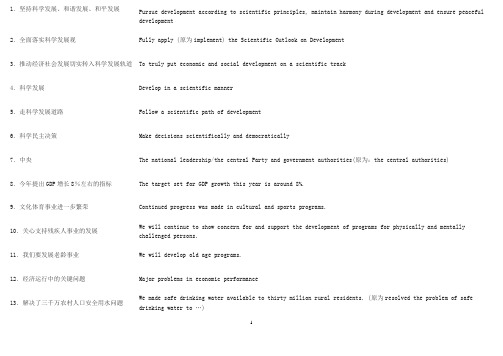
1.坚持科学发展、和谐发展、和平发展Pursue development according to scientific principles, maintain harmony during development and ensure peacefuldevelopment2.全面落实科学发展观Fully apply (原为implement) the Scientific Outlook on Development3.推动经济社会发展切实转入科学发展轨道To truly put economic and social development on a scientific track4.科学发展Develop in a scientific manner5.走科学发展道路Follow a scientific path of development6.科学民主决策Make decisions scientifically and democratically7.中央The national leadership/the central Party and government authorities(原为:the central authorities)8.今年提出GDP增长8%左右的指标The target set for GDP growth this year is around 8%.9.文化体育事业进一步繁荣Continued progress was made in cultural and sports programs.10.关心支持残疾人事业的发展We will continue to show concern for and support the development of programs for physically and mentally challenged persons.11.我们要发展老龄事业We will develop old age programs. 12.经济运行中的关键问题Major problems in economic performance13.解决了三千万农村人口安全用水问题We made safe drinking water available to thirty million rural residents. (原为resolved the problem of safe drinking water to …)14.制定措施解决农民工问题Formulate policies to address difficulties rural migrant workers face in cities (原为to solve the problem of rural migrant workers in cities)15.要抓紧解决下岗职工就业问题We need to work quickly to resolve the issue of providing reemployment for laid-off workers.16.国有企业历史遗留问题The long-standing problems of SOEs17.解决群众关心的看病难问题Solve the difficulty (原为 problem) of obtaining medical service, an issue of public concern18.解决人民群众最关心、最直接、最现实的利益问题Solve the most practical problems that are of most concern to the people and most directly affect their interests19.我们必须以对国家和人民高度负责任的精神采取有力措施解决这些问题We must maintain a strong sense of responsibility to the country and people and take forceful measures (原为forceful steps) to resolve these problems.20.必须把解决”三农”问题作为全部工作的重中之中We must put resolution of issues relating to agriculture, rural areas and farmers at the very top of our work agenda.21.着力解决民生问题Every effort was made to improv e the people’s well-being.22.解决拖欠工程款和农民工资问题Resolve the problem of default on construction costs payment and unpaid wages for rural migrant workers.23. 政府自身建设存在一些问题Government efforts to enhance performance still have room for improvement.24. 存在这些问题根本在于制度不健全,监管不到位The root cause of the problems lies in institutional deficiencies and poor oversight.25. 基层民主政治建设加强Continued progress was made in democracy at the village and community level.26. 领导干部要深入基层了解群众疾苦Leading officials should visit communities (不用grassroots) to better understand (原为 find about) the problems troubling the people.27. 加强基层民主Expand democracy at village and community level28. 经济结构矛盾突出There are still serious structural problems in the economy.29. 银行资金流动性过剩问题突出The problem of excessive liquidity(原为:liquidity in banks) is serious.30. 国际收支不平衡矛盾比较突出Imbalance in international payments is fairly serious.31. 着力解决外贸顺差过大的矛盾Take measures to reduce the excessively large trade surplus (原为 to mitigate the problem of excessively large trade surplus)32. 从各方面采取措施缓解国际收支不平衡的矛盾Adopt various measures (原为in various areas) to ease imbalance in international payments33. 引发投资增长过快的因素仍然存在The factors causing overheated investment remain.34. 法定支出Legally mandated expenditure35. 政策性企业破产Policy mandated bankruptcy of enterprises36. 不少支出增长是刚性的Many increases in expenditure are fixed/mandatory.37. 积极稳妥推进企业政策性破产工作Actively yet prudently proceed with work related to policy mandated bankruptcy of enterprises38. 外贸顺差较大The foreign trade surplus has become large (原为too large, quite large).39. 中央财政2003-2006年超收较多The central government revenue exceeded targets by a fair amount for the years 2003 through 2006.40. 当前财政形势较好The current state of public finance is fairly good.41. 重点领域和关键环节改革取得新进展Further progress was made in reform in key areas and crucial links.42. 加强财政税收对经济运行的调节We improved the role of fiscal and tax measures in regulating economic activity.43. 严肃查处土地使用违法行为Took stern actions against (原为severely dealt with) violations of laws and regulations concerning land use44. 固定资产投资增幅回落The growth rate in fixed assets investment dropped (原为declined).45. 避免经济增长由偏快转为过热We worked hard to prevent rapid economic growth from becoming overheated growth.46. 这些措施进一步调动了农民种粮的积极性These steps gave farmers more incentive to produce grain.47. 加快经济结构调整Accelerate adjustment of the economic structure/system (原为accelerate economic restructuring)48. 对产能过剩行业进行重组To carry out restructuring of industries with surplus production capacity49. 淘汰煤炭行业落后产能Close down backward production facilities in the coal industry (原为eliminate backward production capacity in the coal industry)50. 关系国民经济全局的重大工程Key projects vital to China’s economy were completed. (原为 key projects bearing on the national economy were completed)51. 为增强经济增长后劲发挥重要作用Play an important role in sustaining China’s economic development52. 整顿小煤矿取得了阶段性成果Major progress was made in the current stage of our efforts to restore order in the small coalmines.53. 振兴东北工作顺利开展The work of rejuvenating Northeast China is proceeding smoothly.54. 国有经济布局调整取得新的进展Progress was made in adjusting the distribution of the state sector of the economy.55. 上市公司股权分制改革基本完成Reform of introducing shareholder structure in listed companies was basically completed.56. 规范收入分配秩序Standardize pattern of income distribution57. 整顿和规范市场秩序Improve market order (原为improve and standardize market order)58. 改革深化为经济社会发展注入了新的动The deepening of reform added fresh vitality and gave new impetus to economic and social development. 力59. 我们优先发展教育We put education high on the development agenda.60. 高等学校在校总人数达到两千三百万. The total college attendance reached 23 million.61. 这标志高等教育发展达到了一个新水平. This marks a new level in the development of higher education in China.62. 历史罕见的严重自然灾害Natural disasters of a severity seldom seen in history63. 政务、厂务、村务公开不断扩大Government, factory and village affairs were made more transparent.64. 颁布了29个行政法规Promulgated 29 sets of administrative regulations65. 实施治理商业贿赂专项行动 A campaign to combat business bribery was launched.66. 依法打击经济犯罪People guilty of economic crimes were penalized.67. 民族宗教工作进一步加强Work related to ethnic groups and religion was further improved.68. 实事求是Pursue a realistic and pragmatic approach (原为seek truth from facts)69. 解放思想Free our minds(原为:emancipate our minds)70. 政府工作中还有一些缺点和不足There are some shortcomings and inadequacies in the work of the government.71. 一二三产业比例不合理There is a lack of proper balance among primary, secondary and tertiary industries.72. 投资消费关系不协调Investment is not in keeping with consumer demand. (原为consumption demand)73. 经济增长模式粗放The pattern of economic growth is inefficient. (原为extensive)74. 政府职能转变滞后Moves to change the way the government functions are behind schedule/have not made expected progress.75. 政企不分现象仍然突出Non-separation of government administration and enterprise management remains a serious issue.76. 向人民交出满意的答卷To deliver a good report to the people77. 政府工作的基本思路是: The basic approach for the work of government is:78. 着力调整经济结构Speed up adjustment of economic structure/system (原为speed up economic restructuring)79. 努力实现国民经济又好又快发展Work hard for sound and fast development of China’s economy80. 电视覆盖从行政村向自然村延伸TV coverage extends from incorporated villages to unincorporated villages(原为:administrative villages and natural villages).81. 认真贯彻行政许可法Implement in earnest the Administrative Permit Law82. 关心中国现代化建设To care about China’s modernization83. 城市最低生活保障制度System of basic (原为minimum) cost of living allowances for urban residents84. 最低工资制度The system of minimum wages85. 加快建设法治政府We accelerated development of government by the rule of law.86. 全面推进依法行政Advance all aspects of government administration in accordance with the law87. 全面推进社会主义经济建设、政治建设、文化建设Promote all aspects of socialist economic, political and cultural development88. 调整投资与消费的关系Adjust the balance between investment and consumption89. 稳定消费预期,扩大即期消费We should ensure (不用stabilize) consumer confidence and expand immediate consumption.90. 培养旅游、休闲、健身等消费热点Develop consumption growth areas such as tourism, recreation and exercise91. 坚持区别对待Take different approaches to different situations92. 实现现代化的宏伟目标Attain the ultimate goal (原为grand goal) we have set for modernization93. 目前我们正在采取一系列措施节能(原为at present, 后去掉) We are taking steps to save energy.94. 重工业增长过快Growth in heavy industry is overheated (原为excessive).95. 监管不到位/监管不力Poor oversight96. 以更高昂的精神状态恪尽职守We must carry out our duties with greater drive (原为with an even more enthusiastic attitude).97. 降低消耗Reduce consumption of energy and resources98. 根据经济运行的新情况完善政策Improve policies in response to new developments in the operation of the economy99. 把各项政策落到实处Truly put all policies into effect100. 重点是加强宏观调控The focus of this effort is to strengthen macroeconomic regulation101. 有保有压, 不搞一刀切We should encourage growth in some sectors and discourage it in others, treating each sector according to its specific situation.102. 妥善处理内需和外需的关系Properly balance domestic demand and international demand103. 统筹考虑国内外经济发展的相互联系和影响Take into consideration the interconnectedness and mutual influence of domestic and international economic development104. 我们未能完成去年年初确定的节能目标We fell short of the targets set at the beginning of last year to reduce energy consumption.105. 国务院将每年如实向全国人大报告节能进展情况The State Council will report on the actual progress made in saving energy to the NPC annually. 106. 把节能放在更突出的位置Attach greater importance to saving energy107. 维护社会公正正义Safeguard social fairness and justice108. 使全体人民共享改革发展成果To ensure that all the people share the fruits of reform and development109. 以改革开放为动力推进各项工作Make reform and opening-up a driving force behind all work110. 坚持社会主义市场经济改革的方向We must continue in the direction of reform to deepen the socialist market economy (不是stick to the orientation of …).111. 抓好以下几个方面: We should concentrate on the following areas:112. 解决出口退税历史欠帐Resolve long-standing arrears in export tax rebates113. 放宽市场准入Relax control over market entry114. 鼓励个体经营Encourage individually operated business115. 非公有制经济Non-public economic sectors116. 市场主体产权日趋多元化The ownership of companies has become increasingly diversified.117. 两种企业所得税并存的历史条件发生的根本性变化Fundamental changes have taken place in the historical conditions justifying two corporate income tax rates.118. 统一企业所得税的时机和条件现已成熟Timing and conditions are now ripe for unifying corporate income tax rates.119. 这将使内外企业处于平等竞争地位。
科学管理 英文作文
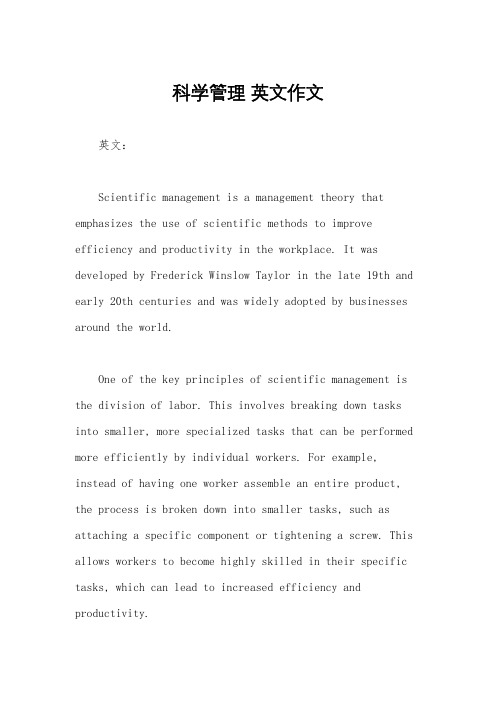
科学管理英文作文英文:Scientific management is a management theory that emphasizes the use of scientific methods to improve efficiency and productivity in the workplace. It was developed by Frederick Winslow Taylor in the late 19th and early 20th centuries and was widely adopted by businesses around the world.One of the key principles of scientific management is the division of labor. This involves breaking down tasks into smaller, more specialized tasks that can be performed more efficiently by individual workers. For example, instead of having one worker assemble an entire product, the process is broken down into smaller tasks, such as attaching a specific component or tightening a screw. This allows workers to become highly skilled in their specific tasks, which can lead to increased efficiency and productivity.Another principle of scientific management is the use of time and motion studies. This involves analyzing the tasks performed by workers to identify the most efficient way to complete them. For example, a time and motion study might reveal that a worker can complete a certain task more quickly by using a different tool or by rearranging the layout of their workspace. By identifying and implementing these improvements, businesses can increase efficiency and productivity.In addition to these principles, scientific management also emphasizes the importance of training and development for workers. By providing workers with the necessary skills and knowledge, businesses can ensure that they are able to perform their tasks efficiently and effectively. This can lead to increased job satisfaction and motivation, which can in turn lead to increased productivity.Overall, scientific management has had a significant impact on the way businesses operate. By emphasizing efficiency and productivity, it has helped businesses tobecome more competitive and successful in the global marketplace.中文:科学管理是一种管理理论,强调使用科学方法来提高工作场所的效率和生产力。
管理科学与研究中英文版
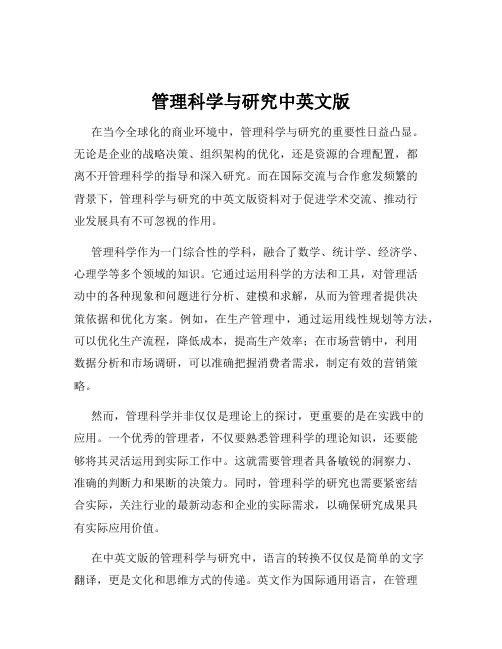
管理科学与研究中英文版在当今全球化的商业环境中,管理科学与研究的重要性日益凸显。
无论是企业的战略决策、组织架构的优化,还是资源的合理配置,都离不开管理科学的指导和深入研究。
而在国际交流与合作愈发频繁的背景下,管理科学与研究的中英文版资料对于促进学术交流、推动行业发展具有不可忽视的作用。
管理科学作为一门综合性的学科,融合了数学、统计学、经济学、心理学等多个领域的知识。
它通过运用科学的方法和工具,对管理活动中的各种现象和问题进行分析、建模和求解,从而为管理者提供决策依据和优化方案。
例如,在生产管理中,通过运用线性规划等方法,可以优化生产流程,降低成本,提高生产效率;在市场营销中,利用数据分析和市场调研,可以准确把握消费者需求,制定有效的营销策略。
然而,管理科学并非仅仅是理论上的探讨,更重要的是在实践中的应用。
一个优秀的管理者,不仅要熟悉管理科学的理论知识,还要能够将其灵活运用到实际工作中。
这就需要管理者具备敏锐的洞察力、准确的判断力和果断的决策力。
同时,管理科学的研究也需要紧密结合实际,关注行业的最新动态和企业的实际需求,以确保研究成果具有实际应用价值。
在中英文版的管理科学与研究中,语言的转换不仅仅是简单的文字翻译,更是文化和思维方式的传递。
英文作为国际通用语言,在管理科学领域具有广泛的应用和影响力。
许多重要的管理理论和研究成果都是以英文发表的,因此,掌握英文对于获取最新的管理科学知识至关重要。
而将中文的管理科学研究成果翻译成英文,不仅能够让国际同行了解中国的管理实践和研究进展,也有助于推动中国管理科学的国际化发展。
在进行中英文版的管理科学研究时,需要注意语言的准确性和专业性。
管理科学领域有许多专业术语和特定的表达方式,在翻译过程中必须确保这些术语的准确无误,以避免产生歧义。
同时,由于中英文在语法和表达方式上存在差异,在翻译时需要进行适当的调整和转换,使译文符合英文的表达习惯。
例如,中文中常常使用的一些形象化、隐喻性的表达,在英文中可能需要进行更加直接、明确的表述。
英文翻译中文在线翻译:科学发展观
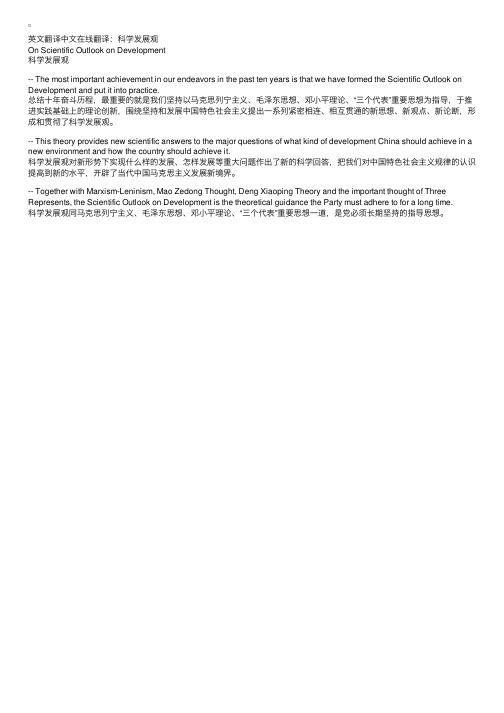
英⽂翻译中⽂在线翻译:科学发展观On Scientific Outlook on Development科学发展观-- The most important achievement in our endeavors in the past ten years is that we have formed the Scientific Outlook on Development and put it into practice.总结⼗年奋⽃历程,最重要的就是我们坚持以马克思列宁主义、⽑泽东思想、邓⼩平理论、“三个代表”重要思想为指导,于推进实践基础上的理论创新,围绕坚持和发展中国特⾊社会主义提出⼀系列紧密相连、相互贯通的新思想、新观点、新论断,形成和贯彻了科学发展观。
-- This theory provides new scientific answers to the major questions of what kind of development China should achieve in a new environment and how the country should achieve it.科学发展观对新形势下实现什么样的发展、怎样发展等重⼤问题作出了新的科学回答,把我们对中国特⾊社会主义规律的认识提⾼到新的⽔平,开辟了当代中国马克思主义发展新境界。
-- Together with Marxism-Leninism, Mao Zedong Thought, Deng Xiaoping Theory and the important thought of Three Represents, the Scientific Outlook on Development is the theoretical guidance the Party must adhere to for a long time.科学发展观同马克思列宁主义、⽑泽东思想、邓⼩平理论、“三个代表”重要思想⼀道,是党必须长期坚持的指导思想。
与科学发展观有关的口译中译英练习
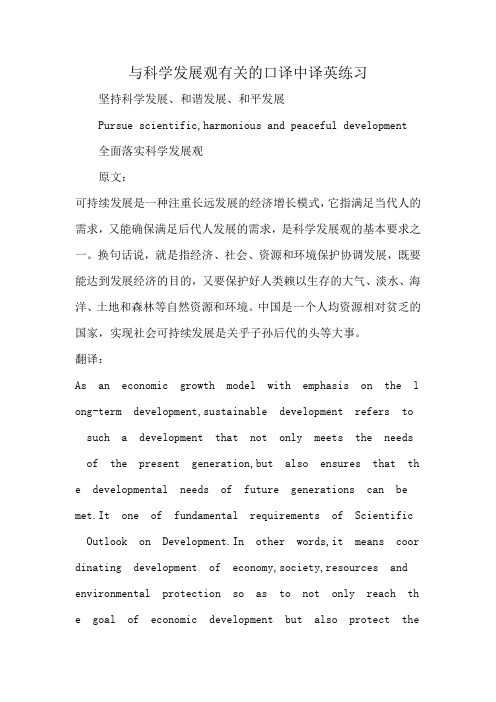
与科学发展观有关的口译中译英练习坚持科学发展、和谐发展、和平发展Pursue scientific,harmonious and peaceful development 全面落实科学发展观原文:可持续发展是一种注重长远发展的经济增长模式,它指满足当代人的需求,又能确保满足后代人发展的需求,是科学发展观的基本要求之一。
换句话说,就是指经济、社会、资源和环境保护协调发展,既要能达到发展经济的目的,又要保护好人类赖以生存的大气、淡水、海洋、土地和森林等自然资源和环境。
中国是一个人均资源相对贫乏的国家,实现社会可持续发展是关乎子孙后代的头等大事。
翻译:As an economic growth model with emphasis on the l ong-term development,sustainable development refers to such a development that not only meets the needs of the present generation,but also ensures that th e developmental needs of future generations can be met.It one of fundamental requirements of Scientific Outlook on Development.In other words,it means coor dinating development of economy,society,resources and environmental protection so as to not only reach th e goal of economic development but also protect theenvironment and natural resources such as the atmo sphere,fresh water,ocean,land and forest which human beings rely on for survival.As China is a country relatively poor in per capital resources,the sustaina ble development of society is a significant issue o f top priority for China`s coming generations.原文:最近中国科学院(Chinese Academy of Science)出版了关于其最新科学发现与未来一年展望的年度系列报告。
- 1、下载文档前请自行甄别文档内容的完整性,平台不提供额外的编辑、内容补充、找答案等附加服务。
- 2、"仅部分预览"的文档,不可在线预览部分如存在完整性等问题,可反馈申请退款(可完整预览的文档不适用该条件!)。
- 3、如文档侵犯您的权益,请联系客服反馈,我们会尽快为您处理(人工客服工作时间:9:00-18:30)。
关于时代发展与管理及管理学的科学性中英文翻译About English scientific development and management and Management Science in Translation摘要百年管理科学化进程构建了庞大的管理科学体系,管理科学知识不断运用到管理实践中去,在一定程度上提高了管理效率和管理学科的科学性。
论述了管理与管理学现实属性和最终属性,以及管理学面临的挑战等观点。
Abstract the hundred years of scientific management process to build a huge scientific management system, knowledge management science continued to use in management practice, to a certain extent, improve the scientific management efficiency and management disciplines. Discusses the management and management science practical properties and final properties, and management challenges.关键词管理管理学科学属性艺术属性The scientific attribute of art attribute key management20世纪是管理学发展的一个世纪,在短短的100年里,已经形成了很多流派,如经验学派(经验学派又称案例学派)、群体行为学派、管理科学学派、经理角色学派、管理过程学派等等。
20世纪的管理学思想活跃、流派众多,为后来构筑管理科学知识体系打了夯实基础,极大提高了管理效率、孕育与发展了管理与管理学科学性的思想,也为管理与管理学发展的奠定了最初的方向—管理科学化。
特别是第二次世界大战以后,随着西方社会的战后复兴和生产力的高速发展,管理教育和管理研究都有了蓬勃的发展。
这一时期,从事管理研究和教育的队伍的构成发生了明显的变化。
管理理论学派林立、百家争鸣,进入了一个空前繁荣的阶段。
The twentieth Century is a century of the development of management science, in a short span of 100 years, already formed many schools, such as school of experience ( experience school called the case school ), group behavior school, School of management science, the manager role school, school management process etc.. In twentieth Century the management thought is active, many schools, played solid foundation for later to build knowledge by scientific management system, improve management efficiency, creation and development of the management and management science of thought, but also for the management and the management development laid the initialdirection of scientific management. Especially after the Second World War, with the western social postwar reconstruction and productivity of high-speed development, education and management research has the vigorous development. During this period, obvious changes have taken place in the management of research and education team. Management theory school buildings, contention of a hundred schools of thought, has entered a period of unprecedented prosperity.1“和平崛起”呼唤管理与管理学的科学化1 " peaceful rise " call management and management science自1978年改革开放以来,中国以崭新的姿态出现在世人面前。
这期间,记载着中国人的酸甜苦辣,又承载着中华民族太多的责任与使命。
从对“黄祸论”、“崛起论”、“威胁论”、“崩溃论”等各种评论中“韬光养晦”转变,到2003年中国领导人首次向外界明确提出了让全世界人为之一震的中国将和平崛起。
和平崛起理论的提出代表我国治国理论和对外政策的重大战略思维形成,这对于国人也提出了更多希望与要求。
无论在经济、文化、政治方面都需要积极支撑这一重大理论。
Since the 1978 reform and opening up, China appeared in the world with a new attitude. During this period, Chinese records the sour, sweet, bitter, hot, and carrying the responsibility and mission of too much of the Chinese nation. From the " Yellow Peril ", " rise ", " threat", " collapse theory " and other comments " low profile" transformation, to 2003 Chinese leaders outside first explicitly put forward the people of the world to one of the peaceful rise of China will shock. Peaceful rise theory put forward the great strategic thinking on behalf of foreign policy and law theory of our country, the Chinese people also put forward more hope and requirements. Whether in the economic, cultural, and political aspects need to actively support this important theory.管理是伴随着人类实践活动发展起来的,哪里有人类活动,哪里就需要管理。
在经济、政治、文化方面对于科学管理及管理学科学化方面要求更高。
中国共产党带领中国人民抗击帝国主义及国民党反动派,建立了新中国,到后来建设发展有中国特色社会主义之路,都体现了中国共产党丰富的管理学知识,在那个特殊的年代,中国共产党面临复杂的国内外形势,要管理和协调一批受封建思想和近代帝国主义资本主义压迫而具有“大杂烩思想”的老百姓(农民阶级、工人阶级、小资产阶级等),需要多么丰富与科学的管理学知识。
社会发展到全面建设小康社会时期,我国综合国力已明显提高,这对于管理与管理学提出了更多新的课题,国家要和平崛起,国家要发展强大,没有科学管理思维的引导是很难有所成就的。
Management is accompanied by the development of human practice activities, where there are human activities, where you need to manage. In the economic, political, and cultural aspects of the scientific management and management science demands higher. The Communist Party of China led the Chinese people to fight against imperialism and the Kuomintang reactionaries, the establishment of a new China, to the later development of socialism with Chinese characteristics of the road, reflects the Communist Party of China is rich in knowledge management, in that particular era, the Communist Party of China is facing the complicated international situation, to the coordination and management of a number of feudal ideology and modern imperialist capitalist oppression and a " smorgasbord " people ( working class, peasant class, the petty bourgeoisie ), need how rich management and scientific knowledge. The social development to the period of building well-off society in an all-round way, our comprehensive national strength has been significantly improved, the management and the management put forward more new topic, the nation wants peace rise, countries should develop powerful, there is no scientific management thinking guide is difficult to achieve.要适应目前这个全球一体化的大趋势,国家的政治、经济、文化等各个方面需要艺术的微笑、需要人性化的管理、需要有创意的发展模式,这些都有赖于管理的科学化。
